Sergeant Maurice George Delpratt: A Prisoner of War in Turkey
By JOL Admin | 11 October 2016
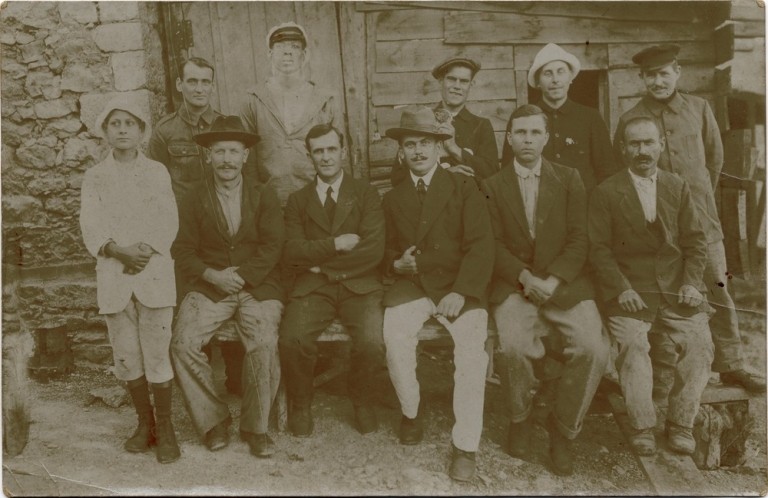
Group photograph of allied prisoners of war at Hadji-Kiri camp, Turkey. Maurice George Delpratt is seated in the front row, third from left. Source: John Oxley Library, Accession 28115/121.
A highly significant World War I collection held by the John Oxley Library is the correspondence of Sergeant Maurice George Delpratt of the 5th Light Horse Regiment. Delpratt, from Tamborine, Queensland, was captured by the Turks at Gallipoli in June 1915 and remained a prisoner of war for the duration of hostilities. The collection was generously donated to the State Library in 2012 by Delpratt's three daughters who had lovingly preserved almost 200 letters and postcards which their father had written to his family.
Maurice George Delpratt was born at Tamborine, Queensland, on the 23rd December 1886, being the son of Joseph Henry Delpratt and Ada Stewart Haggard. The couple had thirteen children, including two sons and a daughter who had died in infancy.
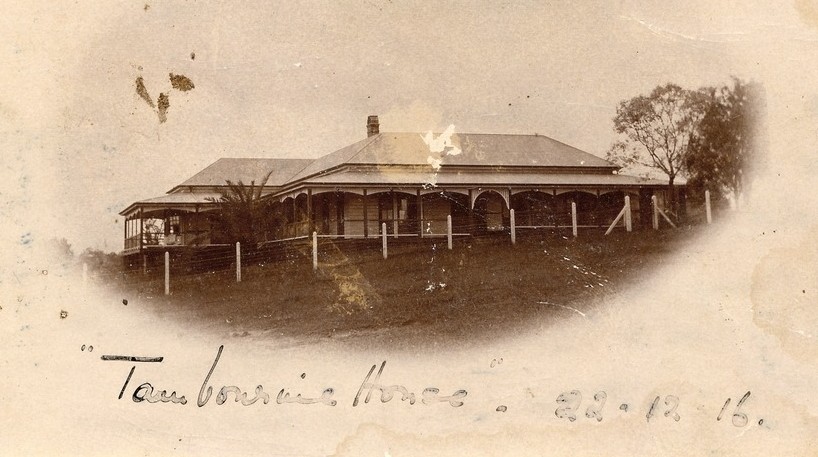
Tambourine House, the home of the Delpratt family. Source: John Oxley Library, Accession 28115/179.
Maurice was one of the first pupils to attend the Southport School and was later employed there as a housemaster and teacher. To this day, Delpratt House, at the Southport School, is named in his honour. In 1910 he left teaching and took up pastoral interests in Western Queensland.
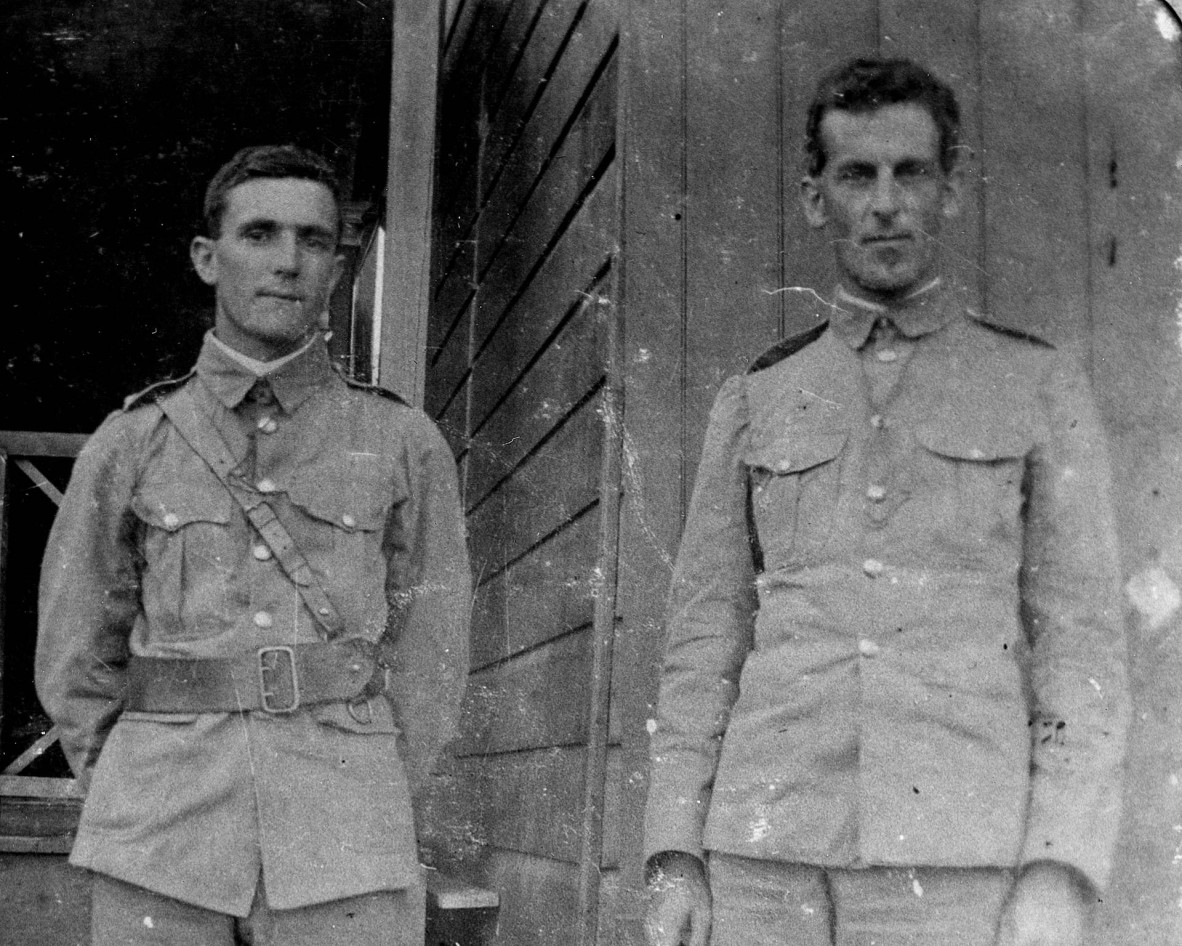
Cadet officers, Maurice George Delpratt (left) and The Reverend Horace Henry Dixon at the Southport School, 1907. Source: John Oxley Library, Negative No. 184070.
At the outbreak of war Maurice enlisted in the 5th Light Horse Regiment and embarked from Sydney on the transport ship A34 Persic on 21st December 1914. Sadly, his mother died while he was on the journey to Egypt and it is to his eldest sister, Nell, to whom he addresses most of his letters.
After training, Maurice arrived at Gallipoli in May 1915. He was captured by the Turks on the 28th June when he was sent out to order the return of a squadron which had ventured too close to the enemy lines. He was officially listed as missing in action and the family was informed of this status in July 1915.
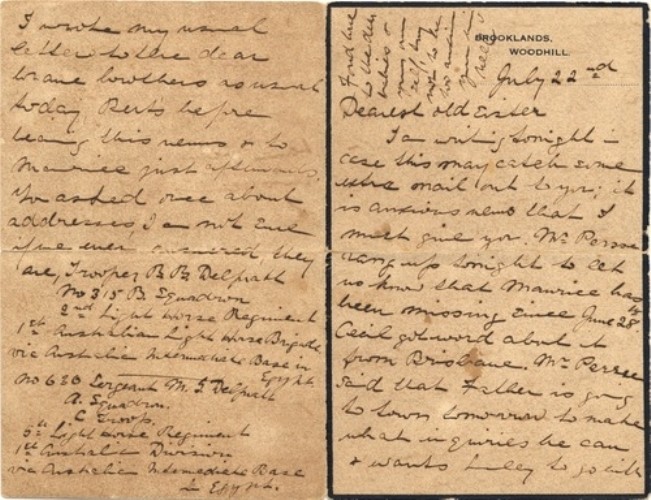
Letter from Elinor White (Nell), sister of Maurice, to one of her sisters. Source: John Oxley Library, Accession 28115/9
It was not until September that they received a letter from Maurice informing them of his capture. He writes:
"We were taking part in an attack on June 28 and received the order to retire. I went out to take the order to a squadron which had gone further out. The way out was pretty unhealthy and I crawled into an old machine gun pit to collect some wits and breath. I collected a frozen spine instead. Our own machine guns spotted me and insisted, with monotonous accuracy, that I was of the opposition. There was nothing for it but to make for an old half filled trench further out which had good overhead cover. The machine gunners' mistake was excusable. I had been only 20 or 30 yards from the enemy and now I was in the middle of him. I was excused the ignominy of laying down my arms, they were promptly laid down for me. And here I am a prisoner of war, having failed in my mission and no longer able to serve my country, but in good health and looking forward to the day when the war ends and I can go home. With the Australians it is considered a disgrace to be captured. It was bad soldiering on my part to get within the enemy’s advanced lines, but I know you will understand it is not lack of courage makes a man do that”. (Maurice George Delpratt Correspondence, 28115/7)
Maurice spent three and a half years in a prisoner of war camp at Hadji-Kiri, near Belemedik, Turkey, in the Taurus Mountains, where he was set to work on the construction of tunnels for the Baghdah to Berlin Railway. Conditions in the camp were difficult with many of the prisoners suffering from malaria and other illnesses. In a detailed letter composed on Christmas day 1917 Maurice writes:
We all looked forward to the three months (Aug. Sept. Oct.) just passed with a good deal of anxiety. But there were very few deaths among the prisoners and none of malaria. Very different to Oct. 1916 when it was exceedingly difficult to muster enough for a burial party, from the 70 men then in camp. Many things have helped in this improvement. For one thing we have become acclimatized. Increased hospital accommodation and the skill & care of Capt. Jones and the hospital sister have also been factors in it. We have had more money and better housing. Quinine has been more plentiful and the invalids comforts sent us, have made convalescence easier. The experience of the previous year taught us much that was useful. All the graves of the 12 who died last year & of Calcutt who died on the first day of this one, have now been fenced in...What most commends itself in our routine here is the liberty. Nothing becomes more distasteful or irritating than to have a bayonet more frequently than a shadow. In Hadji-Kiri we go where we like but have an escort when we go anywhere else... We are not asked to work hard, but the hours are long and what we do gives us no enthusiasm for the job. I am still cleaning and repairing the tunnel machines. (Accession 28115/79)
The prisoners were released after the Armistice in November 1918 and after making their way to Alexandria in Egypt, and later France, were repatriated to England. In a letter written from London on 17th December 1918 Maurice writes:
I am very glad you have kept my letters. They are my only records. I wrote you that after the escape of Gaffney & Websdale the Turkish authorities took all my papers & note-books, & it was only influential friends prevented them giving me another flogging...The trip through France was interesting but the poor people - widow's weeds everywhere & hardly a women not in mourning. (Accession 28115/114)
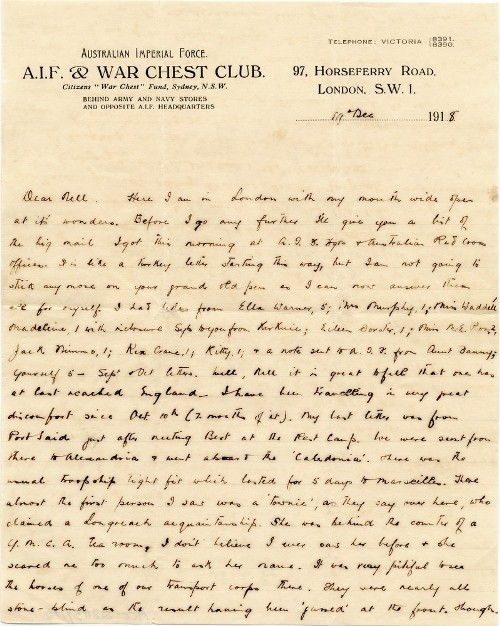
Letter from Maurice Delpratt to his sister Nell, 17 December 1918. Accession 28115/114
After a brief stay in England Maurice returned to Australia on the 3rd July 1919. He spent six years at Tamborine and later became involved in fruit growing in Palmwoods, north of Brisbane. In 1928 he married Mary Esther Davies of Toowoomba. The couple had three daughters. He later worked at the Warwick Post Office and died in Warwick on the 8th March 1957.
A total of 232 Australians were captured as prisoners of war by the Turks during World War I and conditions varied from camp to camp. It is due to Maurice's foresight, and the subsequent care of the letters by his family, that we have such a detailed description of his experiences at Hadji-Kiri and the life of an Australian prisoner of war in Turkey.
Maurice's older brother, Bertram Barnard Delpratt, also served during the war with the 2nd and 5th Light Horse Regiments. He embarked on the transport ship, Star of England, in September 1914 and served at Gallipoli and in the Middle East. He survived the war and rose to the rank of Lieutenant, returning to Australia in December 1918.
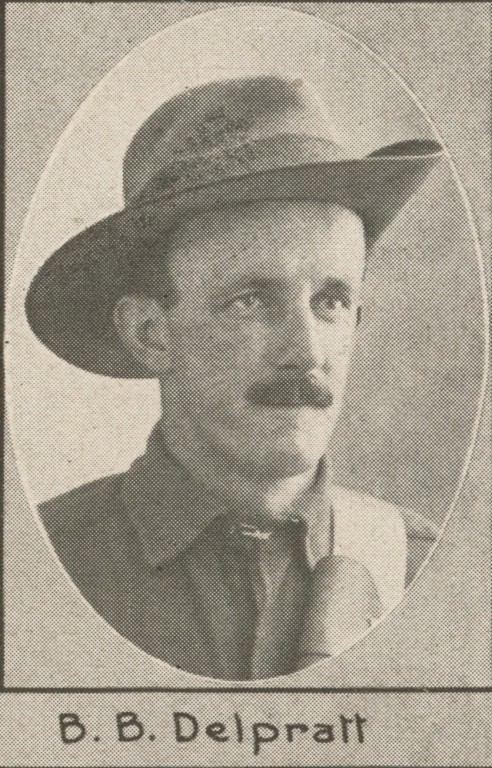
Bertram Barnard Delpratt. Source: John Oxley Library, "The Queenslander", 26 September 1914, p.25.
The Maurice George Delpratt Correspondence, Accession 28115, is available at the John Oxley Library and online.
https://www.youtube.com/watch?v=iIAoGmjWuyk
Lynn Meyers, QANZAC100 Content Curator
Comments
Your email address will not be published.
We welcome relevant, respectful comments.